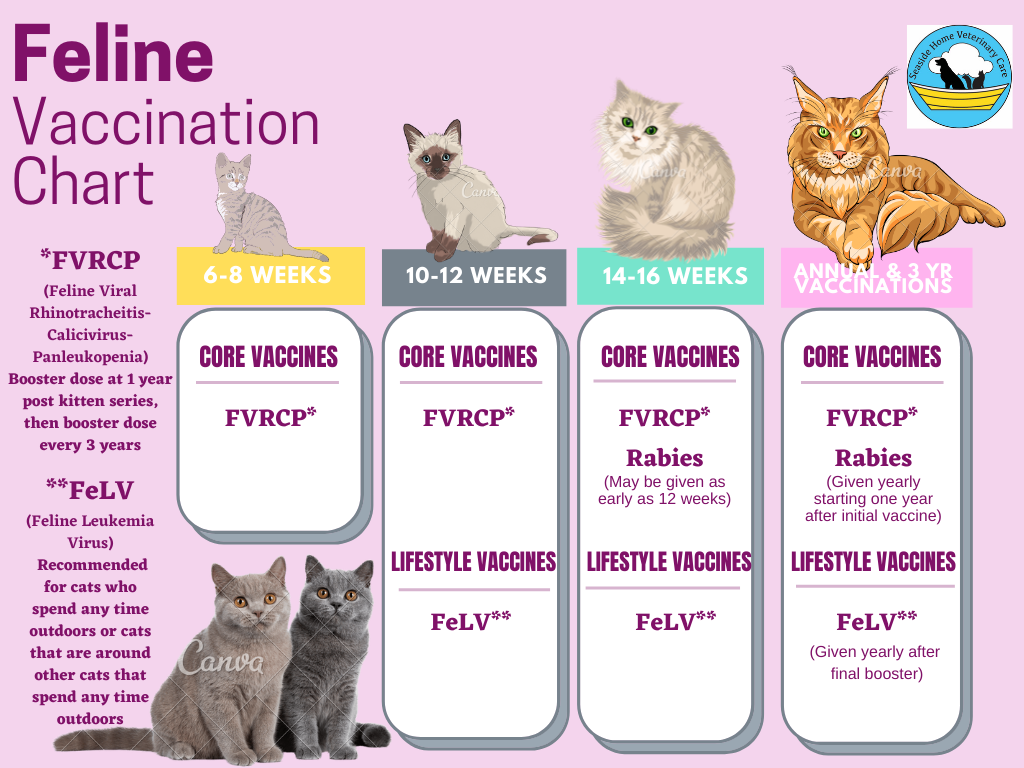Cat & Kitten Vaccination Information
Curious about some steps you can take to protect your pet and promote a healthy life? Read on!
Thank you for looking into getting your cat or kitten vaccinated, or brought up to date on their vaccinations! Listed below you will find all the information you should need to know on getting your kitty properly protected against diseases and viruses to which they may be susceptible!
Each appointment will consist of a house visit fee (price differs depending on your local area) and a consultation and physical examination fee. When having multiple visits for kittens or initial vaccination series, the consultation fee is discounted at the subsequent visits! The vaccination price is the same at each appointment. We also give a complimentary Interceptor Dewormer at the time of vaccination. We’ve included some information on microchipping, which is something we can also do in the comfort of your own home to help keep your pet safe!
Please don’t hesitate to contact us if any of this is unclear or you have any other questions!
(You will also be given a free 6-week Pet Insurance trial at your kitten’s first visit!)
As we are a house call service, we come right into your home! This does, of course, mean that we do not perform surgeries. However, we work with all of the clinics in the city and can provide them with the records of your vaccinations, etc., if you would like to have this portion of your pet care done in the comfort of your own home :)
The following is some more detailed information on everything above!
Microchipping
Microchipping is the insertion of a small (about the size of a grain of rice!) data device under the skin of your pet to allow their information to be accessed should they go missing. Vet clinics and animal shelters everywhere have scanners to use if an animal turns up, and when they scan your pet a unique ID number comes up which is connected to your information. This makes it possible for you to be contacted and reunited with your lost pet! Insertion of the chip is almost always well tolerated, and we have tried to help with this even more by carrying the 24 Pet Watch mini Microchips, which are even smaller! For more information you can check out: https://www.24petwatch.com/Canada/
Core Vaccines for Cats
Rabies
This is a fatal viral disease that can infect all warm-blooded animals, including cats, dogs and humans. It affects the central nervous system, and often first reveals itself through significant changes in a cat’s behaviour, including sudden restlessness, aggression and fear. Spread by the bite of wild animals. Rabies vaccination is INCREDIBLY effective at preventing contraction of the Rabies virus. This vaccination is recommended for ALL CATS.
FVRCP (Feline Viral Rhinotracheitis-Calicivirus-Panleukopenia)
This vaccination provides protection from multiple diseases, as indicated by the acronym above. These are the viruses and a description of what this vaccine aids to provide protection from:
Feline Viral Rhinotracheitis: a syndrome characterized by sneezing, runny nose, irritated eyes, and coughing.
Feline Calicivirus: infection typically presents with a runny nose and moderate sneezing, but the presence of other viruses and bacteria can increase its severity. Painful oral lesions are also a common symptom seen with calicivirus infection.
Feline Panleukopenia: often referred to as “kitty parvo”, this is caused by a type of parvovirus. It affects cats and kittens, though mortality is higher in younger cats. This very contagious, dangerous disease primarily affects the gastrointestinal system, causing fever, loss of appetite, dehydration, vomiting, diarrhea, hypothermia, and even death. Cats become infected when they ingest the contaminated feces of an infected cat, either directly or indirectly.
This combination vaccination is recommended for ALL CATS
Lifestyle Vaccines for Cats
FeLV (Feline Leukemia Virus)
This virus is one of the most important causes of illness and death among cats, and is especially dangerous to young cats. It can cause cancer (lymphoma and leukemia) in infected cats, and contributes to other infectious diseases by suppressing the immune system and infecting the bone marrow. This vaccine is recommended for any cats that go outside, or may come in contact with outdoor cats, as it is spread through bodily fluids, including saliva, and is very contagious.
Vaccination Schedule for new kittens!
Kittens ideally receive vaccinations every 3-4 weeks (beginning around 6 weeks of age) until they are 14-16 weeks of age. If your kitten does not begin their series until 12 weeks of age, they will only need to have two appointments for vaccination, but will be unprotected and possibly very vulnerable to infection before this time.
SEE CHART ABOVE FOR KITTEN SCHEDULE
If vaccinations are given on the appropriate schedule:
FVRCP will need to be given one year after final booster, then three years later, and every 3 years to remain effective.
*Rabies will need to be given once yearly to remain effective.
Feline Leukemia Virus will need to be given once yearly after final booster to remain effective.
*Because of a significant body of research regarding the safety of specific vaccinations in cats, we have chosen to use only a specific type of vaccine in cats. The particular Rabies vaccine that we use can only be given as a one year vaccine. If you would like more information on this, please feel free to discuss it with your veterinarian at your appointment :)
Vaccinations for adult cats
If it has been many years since they have had any vaccinations, it is best that they start out the same as a kitten at 12 weeks (ie: two sets of FVRCP +/- FeLV, and 1 Rabies).
If they are only somewhat overdue, they can simply receive an annual booster that will last them for 1 year from the date of administration. This is a decision that can be made by your veterinarian or through a discussion with your veterinarian at your appointment.

